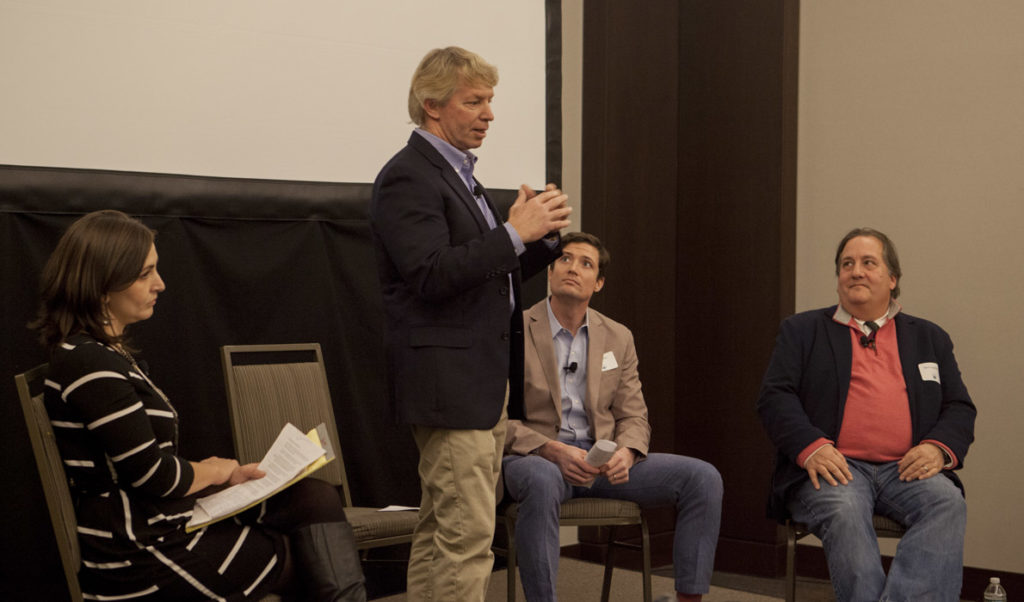On Jan. 19, the Island Institute hosted its second annual Waypoints Forum in Portland. (Videos of the presentations can be seen here.) The theme this year was “Waterfront Futures.” During a panel we called “Big Ideas on the Waterfront,” we heard from business owners who have placed big bets on the future of the Maine coast.
Luke Holden, founder of Luke’s Lobster (and a new member of the Island Institute’s board of trustees), talked about creating a vertically integrated company where each person he works with is a stakeholder in the company’s success—whether it’s someone fishing in Tenants Harbor or buying a lobster roll on the Upper East Side of New York City, each has a stake in the organization’s future.
JB Turner talked about the relationship between the city of Belfast and Front Street Shipyard, which he operates. It was a great reminder of the positive outcomes that can be achieved when a well-intentioned business has a strong partnership with local government.
Mark Ouellette of Axiom Technologies talked about building broadband networks for communities as critical infrastructure projects, and as important educational opportunities. People need to learn how to take advantage of the fiber networks that will be built along the coast in the years ahead.
Axiom’s story dispels the myth that the private sector won’t serve our remote communities. We have many examples in Maine of businesses scaling their services to meet the needs of our small communities.
The acceptance of these businesses—these big ideas on the waterfront—became a source of discussion. What are the elements of town leadership and local outreach that enable private sector businesses to succeed in ways that work for our communities?
In a previous column, I’ve written about bridge personalities. These are the community members who walk comfortably in the many smaller communities that exist within one community. They play an important role as communicators and translators across groups that otherwise don’t talk to each other.
What I didn’t say then, but which I know to be another important element of leadership, is the ability to lead with the right degree of transparency. I’ve only been in Maine 15 years, but one of the most difficult things to witness is seeing a community transition from various forms of matriarchy or patriarchy to a process-oriented community.
The days of handshake deals that allow money to flow from town government to special needs within a community—without public discussion—are on their way out. But in truth, this is still a fact of life for many remote communities throughout Maine.
Some might see this as a shortcoming of the leaders who take this older approach to governing their towns. A more generous read is that this is how these folks learned to lead from their role models. It has a generational element to it as well. Anyone who has led a community for 40-plus years is going to be drawing on a history of learning that spans generations. The idea that leadership looks like controlling information and resources is still alive and well, but it is on its way out.
Today, people want good public process, and they are bringing experience of it from many of the places they lived before coming to Maine. These are people who want the rules followed, they want to have input, they want to know how decisions are being made, and how resources are being allocated.
I learned a while back that the key to leadership is to be clear about how decisions will be made, and what role the people around you will have in decision making. If these are communicated well, then people are more likely to accept the decision, even if they don’t agree with it.
In remote communities throughout Maine, leadership is starting to be defined as the ability to facilitate public dialogue across multiple interests. It includes professional and appropriate communications skills and the ability to explain the “why” behind decisions—including why a certain decision-making process was chosen. This doesn’t come naturally; it comes through training and practice.
As we move toward good processes in town government, we make our towns more predictable to businesses, small and large, like those noted above. They will invest in our communities and become part of the fabric that makes them places where we can live, work, and educate our children.
Rob Snyder is president of the Island Institute, publisher of The Working Waterfront.





